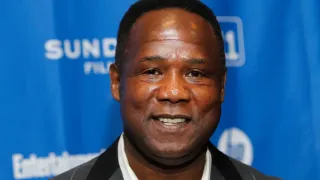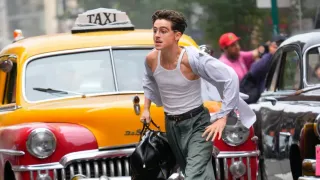January 15, 2019
Sawdust And Tinsel
Greg Vellante READ TIME: 2 MIN.
Ingmar Bergman's "Sawdust and Tinsel" is a complicated film in the sense that its characters are as complex as they come, while the visuals are as clean and clear and comprehensive as they possibly could be. In typical Bergman fashion, the aesthetics of "Sawdust and Tinsel" are filled with shadows and gorgeous compositions by cinematographer Sven Nykvist (Bergman's first pairing with the frequent collaborator), as well as slow push zooms on characters when a key emotion is being felt.
For much of the film, we're following the misadventures of a ragtag, essentially penniless traveling circus preparing for one of their shows, but the true focus of Bergman's work is the relationship between the ringmaster and circus owner (�ke Gr�nberg) and his younger mistress (Harriet Andersson). When the former embarks on a quick visit to the wife and sons he hasn't seen in three years, the specifics of these two characters' separation comes into full focus.
It's a fascinating character study, but the viewer must be prepared for the secondhand humiliation that is absorbed vicariously throughout the film. In a brilliant silent segment during the film's opening, a hapless clown is mortified to discover his wife is skinny-dipping with a group of nearby soldiers. And in the film's finale, set in a circus ring, you may find yourself watching through your fingers as the mortification felt by one of the characters is as embarrassing as they come. Throw in the sexual power plays and psychological warfare being shared between an ensemble of increasingly degrading characters, and the film is an uncomfortable viewing that is simultaneously fascinating to its core.
In a new 2K digital restoration with an uncompressed monaural soundtrack, "Sawdust and Tinsel" is now available on Criterion Collection Blu-ray. The (sadly) limited bonus features include:
� Audio commentary from 2007 by Ingmar Bergman scholar Peter Cowie
� Introduction by Bergman from 2003
� An essay by critic John Simon
Despite the lack of additional material, the film alone makes this Criterion worthy of purchase.
"Sawdust and Tinsel"
Criterion Collection Blu-ray
$31.96
https://www.criterion.com/films/842-sawdust-and-tinsel






